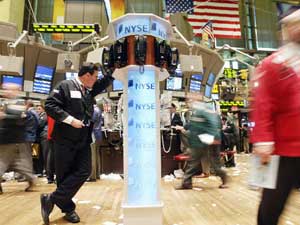|
Photos
Your Voice
|
Why companies sometimes want their stock back
August 15, 2004
 |
| When companies announce plans to buy back stock on the open market it is often intended as a signal of confidence in a company's prospects. (Mario Tama/Getty Images) |
St. Paul, Minn. — You're a CEO. Your company's got more cash than the business needs. Cash doesn't earn much because of low interest rates. Your job is to figure out the best use for that dough to make a profit for your company's shareholders. You could buy another company, develop a new product, or pay shareholders directly with a dividend.
If your share price is slumping, you could have the company buy back stock on the open market.
There are three ways that can boost your company's share price--at least in theory.
First let's pull an old analogy out of the oven.
 | |||
Pie. The profit pie. (What are the main ingredients? Brains and elbow grease, of course.)
Each share of stock entitles the owner to a slice of the profit pie.
John Reik, who teaches finance at the University of Minnesota says when a company buys stock from its own shareholders, there are fewer shareholders remaining to share the profit.
"And if you decrease the number of people sharing in the pie, even if the pie isn't very large, everybody is a little bit more satisfied," says Reik.
It's basic math: one share out of 500 gets you more pie than one out of 1,000.
|
By far and away our shareholder return is going to be determined by our operating performance and our execution of strategies.
- Ryan Robinson, vice president of finance and treasurer, Best Buy Co. |
The second reason is basic supply and demand. A buyback program adds to the demand for your company's shares.
"As the company becomes another buyer for that limited supply of stock, that should start to drive up the price as well. And for the remaining shareholders, they should be happy, because they're looking at their share price going up as well," says Reik.
There's a third reason a buyback program might boost your share price. The people who know the company best, you the management, are effectively sending a message about the stock: "it's a good bargain at this price," says Reik.
Target wouldn't comment. But that's how they see it at Richfield-based Best Buy. The company has had a buyback program since 1998, and recently boosted the total amount to up to $500 million. Treasurer Ryan Robinson says stock price is definitely a factor in the decision.
"Announcing to the public and taking action to buy back stock is a signal, a powerful signal to the investor public that you have confidence in the prospects of the company, and that your share price is fundamentally undervalued, relative to the long-term prospects of the company," says Robinson.
Some research suggests management knows a bargain when it sees one. On average, stock prices rise after a buyback, according to David Ikenberry, a finance professor at the University of Illinois at Urbana-Champaign. He says in the short term, it can produce a 2 to 3 percent increase in share price.
"Over longer horizons of three to four years, companies that have announced stock repurchases, tended to outperform the market by about 12 to 15 percent," says Ikenberry.
But share buybacks are no guarantee of an uptick in the share price.
Last week, Twin Cities-based bed maker Select Comfort increased its stock buyback program. The company's share price has plunged since last month, when the firm said profits would fall short of expectations. A news report about mold in some beds, which the company says was biased, fueled the drop. As for the buyback, the stock has fallen 11 percent since the announcement.
Without referring to Select Comfort, Doug Wright, a corporate finance attorney says there are no guarantees on how investors will respond to a buyback program.
"If the company's doing well, a stock buyback could enhance the value of the stock, but if it's a buyback by an underperforming company that is simply seeking to undertake a repurchase without the fundamentals in its financial performance, it's not likely to do anything," says Wright.
Best Buy's Ryan Robinson says what counts most is how well management runs the business.
"By far and away our shareholder return is going to be determined by our operating performance and our execution of strategies," he says.
Robinson expects more companies to launch buyback programs as rising corporate profits leave companies with bigger piles of cash.
|
News Headlines
|
Related Subjects
|
